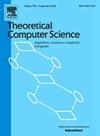背包约束下的聚类:背包中值问题的参数化逼近
IF 1
4区 计算机科学
Q3 COMPUTER SCIENCE, THEORY & METHODS
引用次数: 0
摘要
背包中位数问题,定义在公制空间中的一组客户和设施上,寻求开放设施的子集,并将每个客户连接到开放的设施,目标是最小化客户连接成本的总和,同时将设施开放成本的总和保持在指定的预算范围内。由于FPT的w[2]-硬度,在FPT时间内精确地解决这个问题是不可能的,FPT时间是由打开设施的最大数量(用k表示)参数化的。因此,我们关注于该问题的参数化逼近算法。我们给出了一种基于采样的方法,该方法减小了解的搜索空间,得到了在一般度量空间中运行时间为(kε−1)O(k)nO(1)的(3+ε)-近似算法和在d维欧几里德空间中运行时间相似的(1+ε)-近似算法。本文章由计算机程序翻译,如有差异,请以英文原文为准。
Clustering under a knapsack constraint: Parameterized approximation for the knapsack median problem
The Knapsack Median problem, defined over a set of clients and facilities in a metric space, seeks to open a subset of facilities and connect each client to an opened facility, with the goal of minimizing the sum of client-connection costs while keeping the sum of facility-opening costs within a specified budget. Solving this problem exactly in FPT time, parameterized by the maximum number of opened facilities (denoted by k), is unlikely due to its W[2]-hardness. Thus, we focus on parameterized approximation algorithms for the problem. We give a sampling-based method that reduces the solution search space, which yields a -approximation algorithm running in time in general metric spaces and a -approximation algorithm with similar running time in d-dimensional Euclidean space.
求助全文
通过发布文献求助,成功后即可免费获取论文全文。
去求助
来源期刊

Theoretical Computer Science
工程技术-计算机:理论方法
CiteScore
2.60
自引率
18.20%
发文量
471
审稿时长
12.6 months
期刊介绍:
Theoretical Computer Science is mathematical and abstract in spirit, but it derives its motivation from practical and everyday computation. Its aim is to understand the nature of computation and, as a consequence of this understanding, provide more efficient methodologies. All papers introducing or studying mathematical, logic and formal concepts and methods are welcome, provided that their motivation is clearly drawn from the field of computing.
 求助内容:
求助内容: 应助结果提醒方式:
应助结果提醒方式:


